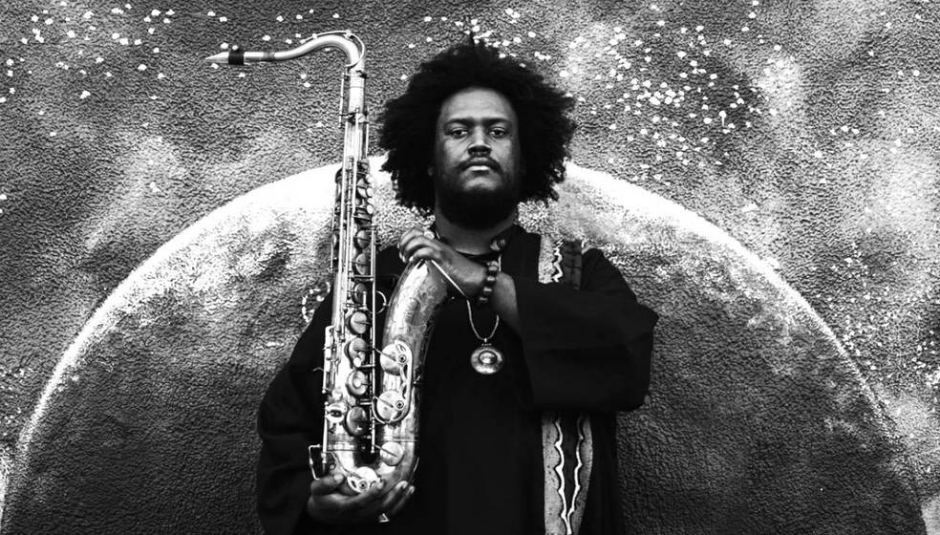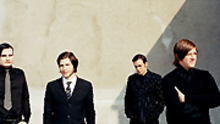In May 2015 Kendrick Lamar released his matchless To Pimp a Butterfly. A month later one of the musicians who contributed to that ground-breaking record appeared with a radical opus of his own. Various excited rumblings circled the album before its release, and The Epic more than met those expectations. But Kamasi Washington’s debut was not riding the coattails of Lamar’s progressive hip hop record - rather it was blazing a trail of it own. Washington put out a three-disc, 172-minute jazz record. Yup, a nearly three-hour sprawling genre record, in 2016, and people loved it.
As I talk to Washington over the phone he is in sunny LA, I am in the UK, its April, and it has just snowed. He tries to convince me it's actually a little chilly over there, but I’m not buying it. My protests are met with warm laughter, which is typical of my conversation with this gracious interviewee. He blends his gentle, relaxed voice and demeanour with obvious enthusiasm and passion for what he does whilst fielding my questions. The first of which is the rather obvious – was he at all surprised at the success and warm reception to what, on paper at least, sounds like a commercial non-starter, or did he always have faith?
“Definitely, when I finished I had faith in it. I wanted to have a big sound on the album, big instrumentation, but I wasn’t really aiming to have an album that was that long (laughs). When I finished it I had exceeded my expectations, but I did believe in it. For the whole time, I was trying to make it on a single disc.”
Be that as it may, the advance of streaming means that new music has very little time to make a connection, as impatient listeners shuffle from one track to another with reckless abandon. It’s not just the length of the record, but also the more complex musicality that makes it a square peg in a round whole in terms of listening trends. But that said, equally we’ve also seen an increasing appetite for classical crossover artists that deal in the longer form and sometimes more intricate nuanced compositions. So does he think the record’s success is indicative of a shift in audience preoccupations?
“There's a growing audience of people who are searching for something that has a different kind of depth to it. Some are long form and they reveal themselves at a slower pace: it’s enjoyed in a different way; it’s music you can just sit and listen to and enjoy as a singular activity; it’s entertainment in and of itself. And it’s opening the door for different genres that have been pushed to the back for a long time to come forward a bit.”
It’s not just the genre or the scope of the record that has made its success a curious one; Washington is an unusual frontman in terms of his chosen instrument. These days you’re just as likely to see musicians pull out a laptop on stage as you are to see them wielding an axe, but his instrument of choice is the saxophone, which has a far more historic look and sound. I wonder what drew the younger man to the brass.
“I’ve been playing music since I was a little kid. I started on drums when I was three, and then piano and clarinet. While I was playing clarinet, I kinda got into jazz, and when I got into jazz, saxophone was the instrument that kind of gripped me the most. And so for two years I wanted to play the saxophone but my dad wouldn’t let me. My dad left the saxophone out one day, so I played my favourite song and I just knew it was the right path. I knew it before, but I knew when I played it that that was my voice.”
The voice he found in that instrument is a distinctive and expressive one. The Epic has a lot going on, and its musical reach is large, but whatever direction the songs wander off in, Washington’s sax is the unifying centre: it’s the tie that binds. Much like Lamar’s record it’s a voice that lends itself to socially conscious meditations, not least on the penultimate track that repurposes Ossie Davis' eulogy for Malcolm X. Recent years have seen few pop musicians delve into political conversations, and it’s interesting that the ones that do tend to be working within hip hop. The lack of engagement Washington says is partly due to “the vulnerability when you express your thoughts with the world and how the world is.” That, and it’s an inherently cyclical process. “I think music goes up and down in its level of seriousness.”
As far as our current cycle goes, he’s sure the changing nature of the way we communicate is key. “Information’s so accessible – when one person knows something it’s so easy for the rest of the world to know it. You see something, you record it and put it on the internet, and all of a sudden people know. That was never the case in the past – that’s something new. And that has kinda ignited the general population to the problems of the world. It’s harder to turn a blind eye because it’s always popping up at you. You can’t keep people in the darkness ‘cause everyone has their own light. So it’s harder to make songs and act like nothing’s going on.”
“The good thing is music is about communication, it’s about expression, and sharing your experience. So, that’s the music that really lasts, that’s the music is timeless, that’s [the music that] really speaks to people, that people really care about. It’s actually connected to the rest of the world. So right now, I think we are in a period that music is getting back to this place where it’s a bridge to culture, to people, and that’s beautiful. And as an artist that makes you vulnerable. You have to be fearless and speak your mind and express your art. When everyone loves you it’s beautiful, but when they don’t it hurts.”
Washington’s record is certainly a bridge to two different musical cultures. Although it’s most definitely a jazz record, The Epic is by no means a retrograde rehash of bygone days. As much as you can hear his musical influence on To Pimp a Butterfly, you can hear that record’s influence on his own.
“I think that I’m a student of the past and a participant in the present. And both can come together, which makes me who I am. When I was trying to make this album, it’s who I am musically. There are subtleties in there that give it both qualities. The harmonies and musicality - they live in both worlds. It includes all the time and effort we spent in studying the music that came before us.”
Which brings us to the label that The Epic was released on. Brainfeeder was founded by Flying Lotus and its focus lies primarily on experimental hip hop and electronica, so not your traditional jazz label. But in terms of Washington’s collaborations and receptive attitude towards genre, it feels like the perfect outlet for his music.
“The whole energy on the label – they have an open mind. And there are so many preconceived notions when you’re kind of the only person doing what you're doing. But on the plus side, I knew that people like Flying Lotus, they understand my music. They didn’t have preconceived notions of what a jazz record should be. Sometimes it’s a fight when you’re on a label that has a history. There can be misunderstandings over things you may need. But [with them] there was openness from day one. There’s a great knowledge of jazz – I knew that he had an understanding, but also an open-mindedness to let me do what I wanted to do.”
Evidently, this kind of freedom extends to his live shows. He’ll be playing a number of gigs throughout the UK this summer, including festival appearances at Glastonbury, Green Man, and even the BBC Proms. I’m curious as to how you recreate a record that incorporates a 20 piece choir and a 36 piece orchestra in addition to the band.
“Well, I try to keep every show like its own little album – its own space and time. Over the time we play music, it's an opportunity to connect with that space and time. So when we come to a place with these songs we play them in the energy and space and the feeling at that moment, so it's like a brand new event. Every day is new, every day is different, places are different. Some nights the band is happy, some nights the band is sad. (laughs) I try and let the music fly and be what it wants to be that day. And you can feel it when we play, it feels like there’s a lot of unknown (chuckles). I don’t know how fast songs are gonna be or what rhythm we’re gonna use; sometimes we change key, sometimes we change cords. It’s just that’s what it is for that night you know. It’s a good thing and a bad thing I guess; I’m just not afraid to fall. I’ve fallen on my face enough times to know that's ok (laughs).”
Does he find European audiences react differently to the music?
“Yeah, there’s definitely a different vibe, but I would say more and more there’s a homogeny in culture. Certain places have a bigger difference than others. I mean the difference between London and New York – there’s a difference for sure – but it's not as extreme as it used to be. The world has definitely gotten smaller, but still, a shared experience comes through. We come from a place, and what we’re coming from, and what we’re experiencing, what the songs mean, they’re on other levels but people experience it in a very similar way.”
I tell him I read a review of a gig he did a while back and the reviewer was shocked that people were dancing to jazz.
“I think that speaks to preconceived notions that somehow it has to be – I mean jazz is such a wide term – it was popular music that people danced to, and dancing is part of its foundation. In more recent times it’s been defined as a certain experience. For us you could easily call it funk-jazz, they just happened to decide to call it something else. You can call rock’n’roll jazz - they’re coming from the same tree, you know? Once people let go of those preconceived notions, then they just react in the way that they react. It's really cool that we’re playing to audiences that are kind of innocent (laughs). They don’t have preconceived notions of jazz, so they don’t know you’re not supposed to dance – they’re just reacting to the music. They move – it happens in a very natural way. People just like to make a box for everything.”
I’m also intrigued by the cover art for his album. Its portrait has a really classic feel to it that’s complemented by a mystic space vibe.
“The cover’s actually me standing in front of a mural in an area where I grew up, Leimert Park. It was important to me that the album said something of who I was and have that same kind of energy to it, and south central LA where I grew up it was very integral to my development. That neighbourhood, on TV, in the media and the news, is portrayed as a very scary, violent place. But Leimert Park is like a cultural hub of LA with so much beauty – artists, musicians, and poets. All these amazing people that live there; it's a beautiful place, and that mural is like right in the middle of where they say the most dangerous place in LA is – and there’s this beautiful mural and it just shows the duality to it. Yeah there are gangs and violence, but there’s also music and it’s like I’m standing in front of a mural, but it actually has a much bigger meaning. It’s a huge painting of this woman with an afro, and that’s one little part of it that I’m standing in front of. It’s a beautiful piece of art and I just wanted to pay homage.”
I also read that he was working on a graphic novel based on the narrative of The Epic. He explains that “it’s a long story”, but that after the recording, and having accrued 45 tracks in the process, he got stuck trying to decide what songs to put on the album. He decided to focus on one to see if there might be a chain reaction. Whilst working on ‘Change Of The Guard’ he fell asleep in the studio and had a crazy dream about warriors, and mountains, and changing of the guards.
“As I was working, I had dreams that were kind of a mini story running along, and they were kind of connected to a bigger story, and that's what inspired me to keep it whole and try to produce it as one thing. It’s why I called the album The Epic, because of the story. I told a couple of people and they were like: “Wow that's pretty amazing, write that down!” (laughs). I had it written down in shorthand, so I’ve been working on actually writing it all out. It's fun when I tell a person the story while the album is playing – it’s like a different way to experience the music.”
It sounds a typically Washington venture: extending already monumental music with an interdisciplinary piece. He’s always building bridges.
As our conversation comes to a close I tell him I hope our unreliable British weather is kind to him for his forthcoming outdoor shows. He convincingly tells me: “We usually bring the LA sunshine with us.” I really hope so.
Kamasi Washington will tour the UK in June; tickets & info can be found here
UK Tour Dates
26th June - Glastonbury
27th June - Glasgow QMU
28th June - Manchester Academy
29th June - Birmingham O2 Institute
30th June - Bristol Anson Rooms
1st July - East Sussex Glynde
2nd July - London Hyde Park























